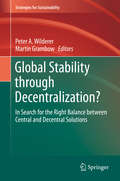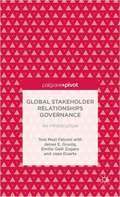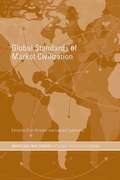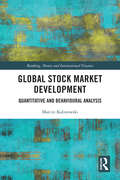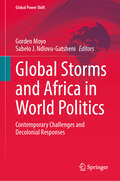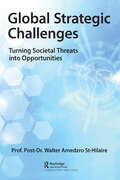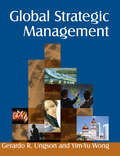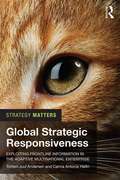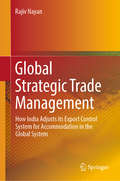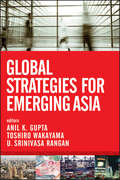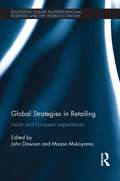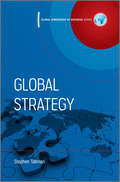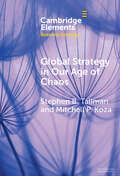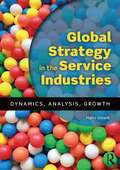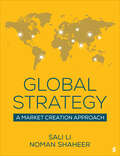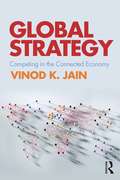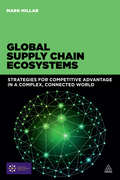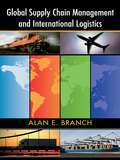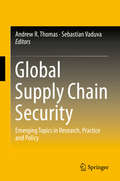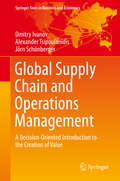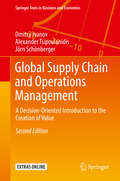- Table View
- List View
Global Sport Marketing: Contemporary Issues and Practice (Routledge Research in Sport Business and Management)
by Michel Desbordes André RichelieuGlobalization has had a profound impact on the sports industry, creating an international market in which sports teams, leagues and players have become internationally recognized brands. This important new study of contemporary sports marketing examines the opportunities and threats posed by a global sports market, outlining the tools and strategies that marketers and managers can use to take advantage of those opportunities. The book surveys current trends, issues and best practice in international sport marketing, providing a useful blend of contemporary theory and case studies from the Americas, Europe and Asia. It assesses the impact of globalization on teams, leagues, players, sponsors and equipment manufacturers, and highlights the central significance of culture on the development of effective marketing strategy. Global Sport Marketing is key reading for any advanced student, researcher or practitioner working in sport marketing or sport business.
Global Stability through Decentralization?
by Peter A. Wilderer Martin GrambowThe authors of this book, who represent a broad range of scientific disciplines, discuss the issue of centralized versus decentralized control and regulation in the context of sustainable development. The stability and resilience of complex technical, economic, societal and political systems are commonly assumed to be highly dependent on the effectiveness of sophisticated, mainly centralized regulation and control systems and governance structures, respectively. In nature, however, life is mainly self-regulated by widespread, mainly DNA-encoded control mechanisms. The fact that life has endured for more than 2. 4 billion years suggests that, for man-made systems, decentralized control concepts are superior to centralized ones. The authors discuss benefits and drawbacks of both approaches to achieving sustainability, providing valuable information for students and professional decision makers alike.
Global Staffing
by Hugh Scullion David G. CollingsStaffing is one of the biggest issues facing companies moving into the global market today. This book provides a multi-disciplinary, integrated and critical discussion-based analysis of current and emerging issues in global staffing. It critically examines best practice and leading approaches, drawing on research from a range of disciplines including international strategy, management, HRM and organizational theory. The key theme of localization is also examined along with the complex associated implementation issues in a number of different regions. This text takes a truly international approach, giving students of HRM and international business an in-depth understanding of the processes of global staffing.
Global Stakeholder Relationships Governance: An Infrastructure
by James E. Grunig Toni Muzi Falconi Emilio Galli Zugaro Joao DuarteBy arguing and detailing the elements of a soft and hard infrastructure approach to the process of global stakeholder relationships governance, this book integrates advanced, flexible and feasible tools to develop an organization's listening culture; integrated reporting as an ongoing process of continued multi-stakeholder reporting.
Global Standards of Market Civilization (RIPE Series in Global Political Economy)
by Brett Bowden Leonard SeabrookeGlobal Standards of Market Civilization brings together leading scholars, representing a range of political views, to investigate how global 'standards of market civilization' have emerged, their justification, and their political, economic and social impact. Key chapters show how as the modern state system has evolved such standards have also developed, incorporating the capacity for social cooperation and self-government to which states must conform in order to fully participate as legitimate members in international society. This study analyzes their justification, and their political, economic and social impact. Civilization is a term widely used within modern political discourse its meaning, yet it is poorly understood and misused. part I explores the idea of a ‘standard of civilization’, its implications for governance, and the use of such standards in political theory and economic thought, as well as its historical application part II presents original case studies that demonstrate the emergence of such standards and explore the diffusion of liberal capitalist ideas through the global political economy and the consequences for development and governance; the International Monetary Fund’s capacity to formulate a global standard of civilization in its reform programs; and problems in the development of the global trade, including the issue of intellectual property rights. This book will be of strong interest to students and scholars in wide range of fields relating to the study of globalization including: international political economy; international political theory; international relations theory; comparative political economy; international law; historical sociology; and economic history.
Global Stock Market Development: Quantitative and Behavioural Analysis (Banking, Money and International Finance #26)
by Marcin KalinowskiIn the current era of globalised financial markets, the stock market cannot be assessed solely by comparing quantitative features such as the number of listed companies or capitalisation on the stock exchange. This is of secondary importance from an investor's point of view. What is important, however, is how a given stock market behaves towards the environment – whether it is ‘hyperactive’ or ‘excessively lethargic’ in response to information. This book provides an innovative tool for assessing global stock markets. It describes the complex concept of ‘stock market development’ in light of classical and behavioural finance theories and considers both quantitative (the number of listed companies, turnover, etc.) and behavioural aspects (price volatility, the behaviour of fundamental indicators of listed companies). Based on an innovative method for assessing development, the author analyses 130 stock markets, indicating those that are more developed in terms of quantity and behaviour. Ultimately, this enables the assessment of which markets are more or less developed and why. This knowledge, used properly, offers an advantage over other financial market participants, and allows for the comprehensive assessment of individual stock markets, which can support the process of making good investment decisions. The book is an invaluable resource for research fellows and students in economics, particularly the field of finance. It is also addressed to business and stock market practitioners, such as financial market analysts, brokers and investment advisers.
Global Storms and Africa in World Politics: Contemporary Challenges and Decolonial Responses (Global Power Shift)
by Sabelo J. Ndlovu-Gatsheni Gorden MoyoAfrica provides a unique perspective to understand today's global crises. This book explores how Africa, positioned historically in a subaltern role due to colonialism, offers a critical lens on the shifting dynamics of the modern world system. The book presents how Africa's continued struggles against racism, colonialism, and economic exploitation make it a powerful site for rethinking the global order. Addressing ecological, ideological, financial, health, and systemic crises, the book demonstrates how problems in Africa are intrinsically linked to global issues. It argues that the so-called decolonization after 1945 was superficial, maintaining global hierarchies that marginalize Africa. With insights from thinkers like Nkrumah and Rodney, it challenges the entrenched structures of racial capitalism and offers new pathways for genuine global equity and justice. This book will appeal to students, scholars, and researchers of international relations, economics, political science, and related disciplines, as well as policy-makers interested in a better understanding of the ongoing global power shift and Africa's challenges and position within the modern world system.
Global Strategic Challenges: Turning Societal Threats into Opportunities
by Walter Amedzro St-HilaireFrom his position as a Senior Fellow, the author addresses in this book the structural challenges and difficulties that predate Covid pandemic: climate change, economic inequality and the demographic challenge. These challenges raise fundamental questions of equity both between and within generations. Their immediate effects are much weaker than their long-term effects, which encourages policymakers to delay. But the cost of meeting them increases over time. These menaces raise complex technical and economic issues; some decisions must be made under great uncertainty. For each of these challenges, solutions exist: why is there little progress and how to turning threats into opportunities? In all cases, technological change is a central aspect, constituting both part of the problem and part of the solution. The solutions the author formulates are of two kinds: policy recommendations and exploratory strategic proposals. Some of the recommendations include measures that have been widely discussed but never implemented. The author wonders why these measures were never implemented? Some of the strategies are more exploratory in nature because they are new or their effects are less well understood, or because the risks associated with their implementation are significant. The author effectively analyzes the different options for exiting the crisis and explains how his proposals differ from the current reforms for global warming, inequality and population aging.
Global Strategic Management
by Gerardo R. Ungson Yim-Yu WongInternational business is undergoing continuous transformation as multinational firms and comparative management evolve in the changing global economy. To succeed in this challenging environment, firms need a well-developed capability for sound strategic decisions. This comprehensive work provides an applied and integrated strategic framework for developing capabilities that lead to global success. It is designed to help readers achieve three essential objectives. First, it provides intellectual and practical guidelines for readers to execute goals and strategies that lead to meaningful and productive results. The book is packed with frameworks, cases, anchoring exercises, techniques, and tools to help readers emerge with a completed business plan after the last chapter. Second, it focuses on strategy and how firms build competitive presence and advantages in a global context. A primary learning objective is to enable readers to understand and evaluate the major issues in strategy formulation and implementation in a global context. Third, it provides an accessible framework that will help guide readers in making strategic decisions that are sound and effective. It offers a unifying process that delineates the necessary steps in analyzing the readiness of a firm to do business abroad. In addition to core issues, each chapter presents frameworks, analytical tools, action-oriented items, and a real-world case - all designed to provide insights on the challenges imposed by globalization and technology on managers operating in a global context.
Global Strategic Responsiveness: Exploiting Frontline Information in the Adaptive Multinational Enterprise (Strategy Matters)
by Torben Juul Andersen Carina Antonia HallinGlobal firms must operate in turbulent conditions, facing relentless pressure to be efficient, whilst also accommodating local factors and ways of thinking. This book offers an insight into how an adaptive multinational enterprise can achieve a sustainable competitive advantage in an uncertain environment. Drawing on ground-breaking research into adaptive strategy, this book introduces compelling tools to help design responsive strategic organizations by cultivating global strategic democracy. Written by two leading scholars, this book provides models to inform strategic decisions through the aggregation of frontline information. With a wealth of illustrative case examples supplementing unique research, this text is essential reading for students of strategic management and provides illuminating insights for the reflective practitioner.
Global Strategic Trade Management: How India Adjusts its Export Control System for Accommodation in the Global System
by Rajiv NayanThis book examines whether India is successfully integrating and adapting to the global strategic management system. It offers essential insights into the evolution of export controls for goods, which may have implications for the development of Weapons of Mass Destruction – an aspect that is especially relevant given India’s robust biotechnological, chemical and nuclear industrial base. In security studies, the phrase “strategic trade management” is now slowly replacing the phrase “export control”. However, for the policymaking community, export control remains popular, at least for the sake of reference.The book also describes the mechanisms India is adopting in this regard. It demonstrates the shift in the Indian approach to strategic trade management, from an outspoken critic to a supporter. Politically, the country was initially skeptical of the idea of export controls because it was a target of such systems. The book also explains the tools, forces and incentives that moved India to adapt its policy on export controls or strategic trade management.
Global Strategies for Emerging Asia
by Anil K. Gupta U. Srinivasa Rangan Toshiro WakayamaThe multinational corporate guide for thriving in the Asian marketplace Led by China and India, the rise of emerging Asia is transforming the structure of the global economy. By 2025, if not sooner, China will almost certainly overtake the U.S. to become the world's largest economy. By then, India is likely to have overtaken Japan to become the world's third largest economy, after China and the U.S. Besides China and India, Asia also includes other fast-growing economies such as Indonesia, Malaysia, Philippines, Thailand, and Vietnam. Added together, by 2025, these developments are likely to make Asia's economy larger than those of the U.S. and Europe combined. It is clear that, for every large company, leadership in Asia is rapidly becoming critical for leadership globally. This important resource brings together the latest ideas and in-depth case analyses from leading academics and practitioners to provide a comprehensive guide to succeeding in Asia. Explores how to develop a strategy to benefit from new patterns of 21st century trade Explains how companies can fight and win against low-cost competition from Asian companies Shows how to transfer homegrown management practices to Asia Reveals how to safeguard the company's intellectual property in China Brings to light how to leverage India as a platform to revitalize the company's innovation capabilities A resource for competing in today's international market, this book offers executives and managers a guide for navigating the new global reality—that of Asia as the world's emerging center of gravity.
Global Strategies in Retailing: Asian and European Experiences (Routledge Studies in International Business and the World Economy)
by John Dawson Masao MukoyamaLarge and medium sized retailers have increased their international operations substantially over the last 25 years. This is evident in: the number of countries to which these retailers expand; the growing international sales of retailers; and the heightening of the level of commitment of retailers to their international activity – a trend that is likely to continue over the next decade as general globalization in the service industries increases. The managerial implications of the moves to become global are considerable. Different retailers are pursuing different approaches, to varying degrees of success and are no longer simply multi-national, but are also multi-continental. Consequently, existing concepts and theories of international business fit uneasily in explanations of international retailing, so new corporate strategies need to be explored. Featuring in-depth studies of seven retailers, by international scholars from Japan, the UK and Sweden, Global Strategies in Retailing explores recent developments in strategy that are related to international retailing and in particular, the emergence of a Global Portfolio Strategy. As such, this book will be important reading for all international business and retailing students and academics researching in these areas.
Global Strategy
by Stephen TallmanThis comprehensive volume from Wiley's Global Dimensions of Business series explores the topic of international strategic management at an MBA or Executive Education level. Authored by an accomplished teacher who possesses a strong understanding of the market, this text offers clear frameworks coupled with lively, international case studies. Written by an experienced teacher possessing a strong research profile and a clear understanding of the market. Emphasizes organizational competences and provides a direct bridge to the strategy frameworks and concepts essential to MBA and Executive Education programs. Focuses on capabilities, capability-building and knowledge, and highlights the distinction between input and leveraging in terms of capabilities. Reviews additional opportunities for making performance gains in the international environment and the additional complexity involved in managing in a global – rather than domestic – environment. All chapters include sections on essential reading, student questions, summaries, case examples, and ‘key terms.’
Global Strategy in Our Age of Chaos: How Will the Multinational Firm Survive? (Elements in Business Strategy)
by Stephen Tallman Mitchell P. KozaChaotic environments are producing unique and unprecedented challenges for multinational companies, challenges that raise important questions about whether and how multinationals will survive or wither away. This Element explores both the macro political, economic, technological, and social forces impacting international business and the strategic management adaptations that leading companies have deployed to respond to these challenges. We observe that a new organizational form – the Global Multi-Business – has evolved that may be especially adapted to respond to and challenge a world in which change is ubiquitous, with the direction of change unpredictable and the pace of change accelerating. It accomplishes this through the strategic assembly of the organization and the animation of its many parts.
Global Strategy in the Service Industries: Dynamics, Analysis, Growth
by Mario GlowikGlobal service-based firms are often 'born global,' and these organizations have developed integrated global strategies based on industry relationships, in order to thrive in new environments. Focusing on these global strategies, this textbook explores the workings of modern service businesses, presenting theoretical management concepts alongside illustrative examples. Original case studies from a range of global sectors, including Starbucks and Facebook, as well as broader studies, such as healthcare in Japan, provide practical insights into the art of thriving as a global business. Written by a leading expert in the field, this multidisciplinary text is a vital read for all scholars and students wishing to view strategic relationships from the focal point of service industries.
Global Strategy: A Market Creation Approach
by Sali Li Noman Ahmed ShaheerGlobal Strategy: A Market Creation Approach is a groundbreaking textbook that redefines the field of global strategy, shifting the focus from scaling established businesses to creating innovative businesses responding to international market needs. Authors Sali Li and Noman Shaheer equip future multinational leaders with the tools and insights needed to succeed in the rapidly evolving world of global business.
Global Strategy: A Market Creation Approach
by Sali Li Noman Ahmed ShaheerGlobal Strategy: A Market Creation Approach is a groundbreaking textbook that redefines the field of global strategy, shifting the focus from scaling established businesses to creating innovative businesses responding to international market needs. Authors Sali Li and Noman Shaheer equip future multinational leaders with the tools and insights needed to succeed in the rapidly evolving world of global business.
Global Strategy: Competing in the Connected Economy
by Vinod K. JainGlobal Strategy: Competing in the Connected Economy details how firms enter, compete and grow in foreign markets. Jain moves away from the traditional focus on developed countries and their multinational enterprises, instead focusing on both developed and emerging economies, as well as their interaction in an increasingly connected world. As the current global business environment is increasingly shaped—and connected—by faster technological developments, geopolitical forces, emerging economies, and new multinationals from those economies, this highly charged dynamic provides rich opportunity to revisit mainstream paradigms in globalization, innovation, and global strategy. The book rises to the challenge, exploring new competitive phenomena, new business models, and new strategies. Rich illustrations, real-world examples, and case data, provide students and executives with the insights necessary to connect, compete, and grow in a globalized business environment. This bold book succinctly covers strategy models and implementation for a range of global players, providing students of strategy and international business with a rich understanding of the contemporary business environment. For access to additional materials, including Powerpoint slides, a list of suggested cases, and sample syllabus, please contact Vinod Jain (vinod.jain01@yahoo.com).
Global Supply Chain Ecosystems
by Mark MillarTwenty-first-century supply chains have evolved into world-wide inter-connected supply-and-demand networks comprising vastly more complex operations, with profound inter-dependencies and exposure to greater volatility in our uncertain world. The linear concept of a chain is therefore no longer adequate to describe these complex international networks of suppliers, stakeholders, partners, regulators and customers that are involved in ensuring the efficient and effective movement of products, services, information and funds around the world - we are firmly in the era of Global Supply Chain Ecosystems. Exploring the latest market trends and industry developments across emerging, developing and developed markets, in Global Supply Chain Ecosystems industry leader Mark Millar presents detailed and practical insights that will help you capitalise on market opportunities, overcome supply chain challenges and make better informed business decisions. In addition to highlighting key supply chain shifts such as the move beyond globalisation back towards regionalisation, this ground-breaking new publication explores several critical aspects of global supply chain ecosystems - including visibility, resilience, sustainability and collaboration.
Global Supply Chain Management and International Logistics
by Alan E. BranchThe development of international trade is driven by international logistics and management and the provision of the global supply chain. The ultimate objective of global supply chain management is to link the market place, distribution network, manufacturing/processing/assembly process, and procurement activity in such a way that customers are serviced at a higher level yet lower cost. Overall this has introduced a new breed of management in a computer literate environment operating in a global infrastructure. Addressing this complex topic, Alan Branch's new book fulfills two clear objectives: to provide a concise, standard work on the subject, written in lucid language that embraces all the ingredients of a notoriously complex subject with a strategic focus to extol best practices and focus on all areas of the industrial and consumer sectors and their interface with changing international market needs. Until now, no book dedicated to international logistics and supply chain management was available. Practically-oriented, this book features numerous case studies and diagrams from logistic operators. An ideal resource for management students, academics and managers who need a succinct treatment of global operations, Branch's book skillfully illustrates his ideas in practice. It is a book which should be on the shelf of every practitioner and student of the subject. Also available from Routledge:Elements of Shipping, Eighth Edition, Alan E. Branch. (978-0-415-36286-3)Maritime Economics: Management and Marketing, Alan E. Branch. (978-0-748-73986-8)
Global Supply Chain Quality Management: Product Recalls and Their Impact (Supply Chain Integration Modeling, Optimization and Application)
by Barbara B. Flynn Xiande ZhaoThis book draws together key insights from the relevant literature across diverse disciplines and presents detailed research case studies of six extended global supply chains in three industries: toys, food, and pharmaceuticals. These case studies cover U.S. companies with supply chains that extend into China and include the perspectives of U.S. and Chinese executives. The book then presents a conceptual model that synthesizes the literature and case studies, and describes the ways in which alternative product recall strategies influence consumers' perception of an organization's corporate social legitimacy and consumers' future purchasing behaviors.
Global Supply Chain Security
by Andrew R. Thomas Sebastian VaduvaThis volume presents new theoretical insights, practical strategies, and policy initiatives in the rapidly evolving field of global supply chain security. As businesses, governments, and society at large have become increasingly dependent on a global network to provide goods and services, protecting global supply chains has become an issue of vital importance for industries, nations, and regions. The "supply chain" encompasses all the links connecting a manufacturer to end users of its products. Links may take the form of plants, supplier warehouses, vendor facilities, ports or hubs, retail warehouses or facilities, and outbound shipping centers. Links also involve all the ways goods are moved-by truck, ship, airplane, or rail car. A great deal can go wrong in the supply chain due to company or systemic mismanagement and inefficiency, criminal activity, employee or technology errors, or terrorism, to name just a few of the threats. Then there are government regulation, industry or association oversight, and security agencies (both public and private) keeping track. Globalization, stricter security regimes, and increasingly sophisticated criminal activity have made cross-border cargo movements more complex, putting the integrity of end-to-end supply chains at much greater risk. This is why the security of the supply chain has become such an important issue for business people: there is too much at stake to let problems proliferate or stagnate. It has been estimated, for example, that thieves now steal $50 billion in goods each year from various points along the supply chain. Synthesizing the most current research, practical application, and policy, Global Supply Chain Security covers a range of emerging topics--from risk assessment to technology deployment to continuity planning--and will serve as a useful resource for anyone concerned with supply chain security issues, including scholars, students, business executives and policymakers.
Global Supply Chain and Operations Management
by Jörn Schönberger Dmitry Ivanov Alexander TsipoulanidisThis textbook presents global supply chain and operations management from a comprehensive perspective, combining value creation networks and interacting processes. It focuses on the operational roles in the networks and presents the quantitative and organizational methods needed to plan and control the material, information and financial flows in the supply chain. Each chapter of the book starts with an introductory case study. Numerous examples from various industries and services help to illustrate the key concepts. The book explains how to design operations and supply networks and how to incorporate suppliers and customers. As matching supply and demand is a core aspect of tactical planning, the book focuses on it before turning to the allocation of resources for fulfilling customer demands. Providing readers with a working knowledge of global supply chain and operations management, this textbook can be used in core, special and advanced classes. Therefore, the book targets a broad range of students and professionals involved with supply chain and operations management. Special focus is directed at bridging theory and practice.
Global Supply Chain and Operations Management: A Decision-Oriented Introduction to the Creation of Value (Springer Texts in Business and Economics)
by Jörn Schönberger Dmitry Ivanov Alexander TsipoulanidisThe second edition of this textbook comprehensively discusses global supply-chain and operations management, combining value creation networks and interacting processes. It focuses on the operational roles in the networks and presents the quantitative and organizational methods needed to plan and control the material, information and financial flows in the supply chain. Each chapter starts with an introductory case study, and numerous examples from various industries and services help to illustrate the key concepts. The book explains how to design operations and supply networks and how to incorporate suppliers and customers. It also examines matching supply and demand, which is a core aspect of tactical planning, before turning to the allocation of resources for fulfilling customer demands. This second edition features three new chapters: “Supply Chain Risk Management and Resilience”, “Digital Supply Chain, Smart Operations, and Industry 4.0”, and “Pricing and Revenue-Oriented Capacity Allocation”. These new chapters provide the structured knowledge on the principles, models, and technologies for managing the supply-chain risks and improving supply-chain and operations performance with the help of digital technologies such as Industry 4.0, additive manufacturing, Internet-of-Things, advanced optimization methods and predictive analytics. The existing chapters have been updated and new case studies have been included. In addition, the preface provides guidelines for instructors on how to use the material for different courses in supply-chain and operations management and at different educational levels, such as general undergraduate, specialized undergraduate, and graduate courses. The companion website www.global-supply-chain-management.de has also been updated accordingly. In addition, the book is now supported by e-manuals for supply-chain and operations simulation and optimization in AnyLogic and anyLogistix. Providing readers with a working knowledge of global supply-chain and operations management, with a focus on bridging the gap between theory and practice, this textbook can be used in core, special and advanced classes. It is intended for broad range of students and professionals involved in supply-chain and operations management.

